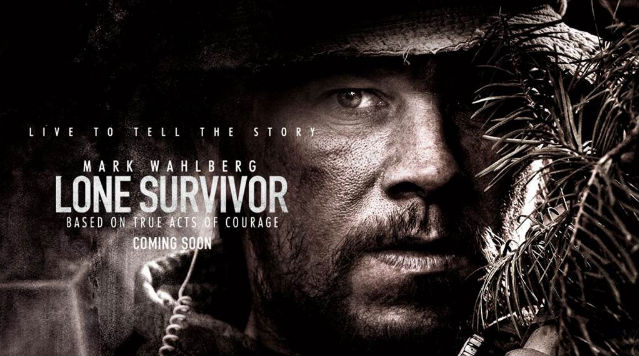SUMMARY
This is AI generated summarization, which may have errors. For context, always refer to the full article.

MANILA, Philippines – It is 2005. Deep into the US war in Afghanistan, SEAL Team 10 has just received orders to execute a mission deep in the Kunar Province. SO2 Marcus Luttrell (Mark Wahlberg), SO2 Danny Dietz (Emile Hirsch), and SO2 Matthew Axelson (Ben Foster), under the command of Lt. Michael Murphy (Taylor Kitsch), are tasked with eliminating a high-profile Taliban target. But when the 4-man team is ambushed in the mountainous tree lines of the Afghan province, the mission becomes the least of their concerns.
Lone Survivor is a military action-drama based on the non-fiction book written by real-life Navy SEAL Marcus Luttrell. While it’d be easy to lump the movie alongside a string of other military adaptations, Lone Survivor is a film that is understandably familiar but also remarkably visceral.
The brutality of war
Make no mistake: Lone Survivor is a brutal film. It is relentless in its depiction of combat and ravenous in its fixation on violence. But all that is part of creating a convincing reenactment of the failed Operation Redwing. While the film’s vicious action scenes aren’t anything we haven’t seen before, there’s something to be said about the emotional intensity from the action scenes.
Writer-director Peter Berg accomplishes that through a specific kind of violence. While it’s easy to get sidelined by the grotesque images of bullets on bone and shrapnel on flesh, the characters themselves earn their connection to the audience.
The cast, led by Mark Wahlberg, is key to this. Unlike other military action films that are content with characterizing their soldiers with a cold facelessness, Wahlberg and his co-actors do a remarkable job of expressing a genuine sense of camaraderie.
Despite the action being Lone Survivor’s most distinguishable trait, the first bullet isn’t fired until around the 45-minute mark. This pays off when audiences become invested in the action, because they are invested in its combatants. And as soon as the first rifle is fired, the film explodes into a maelstrom of gunfire.
However, Berg’s unwavering respect for the film’s true-to-life soldiers doesn’t come without a price. Deaths are depicted with a bludgeoning air of melodrama, and, to this end, becomes romantic and almost pompous. It’s a distracting contrast to the realistic portrayal of combat. When death is in the spotlight, it’s hard to see how war isn’t as well.
The Hollywood agenda
It’s no secret that a majority of moviegoing audiences are influenced by Western sensibilities. Hollywood still manages the most successful export of films all across the world, and is working hard to establish even more in-roads to non-English speaking cultures. While that already speaks volumes about the kind of entertainment we enjoy, it also says a lot about the way we experience our world’s history.
In the case of Lone Survivor, one can’t help but think about the other stories being left out of the conflict. Berg is smart enough to be aware of this, and struggles to provide a more balanced portrayal of local Afghans. But despite Berg’s best efforts, it’s simply beyond the capability of a single storyteller to paint a larger picture of a much broader narrative.
Detractors will undoubtedly criticize Lone Survivor for its overt romanticization of the American military ethos. To that end, they wouldn’t be mistaken. Still, there is a certain nobility to Berg’s intentions. It’s unfair to criticize an American director for telling the American side of an international conflict. This is Peter Berg’s perspective of history, but unfortunately, his might be the more prominent one.
But that’s exactly why we need greater diversity among the storytellers adding to the discussion. We also need greater diversity in the audience consuming this material.
In time, Lone Survivor will undoubtedly be listed among some of the better military action films to be released over the last decade. But hopefully, that list will include films that are just as engaging, just as commendable, and all the more inclusive of voices outside of the United States.
Maybe one day, we’ll hear the other side of the story.
Wach Lone Survivor‘s trailer here:
–Rappler.com

Zig Marasigan is a freelance screenwriter and director who believes that cinema is the cure for cancer. Follow him on Twitter at @zigmarasigan.
More from Zig Marasigan
- ‘Kimmy Dora (Ang Kiyemeng Prequel)’: A fallen franchise
- ‘My Little Bossings’: The horrible business of show business
- ‘Boy Golden’: Violent, colorful, and masterful fun
- ‘10,000 Hours:’ A higher standard of politics
- ‘Pagpag:’ Stylish superstition
- ‘Kaleidoscope World:’ A Magalona melodrama
- ‘Pedro Calungsod: Ang Batang Martir:’ A sermon best saved for church
- MMFF Cinephone: From film to phone
- ‘Islands:’ In the ocean of isolation
- ‘Shift’ is not a love story
- ‘Bukas Na Lang Sapagka’t Gabi Na:’ The art of rebellion
- ‘Blue Bustamante:’ A hero with a heart
- ‘Girl, Boy, Bakla, Tomboy’: A hilariously absurd party of four
Add a comment
How does this make you feel?
There are no comments yet. Add your comment to start the conversation.